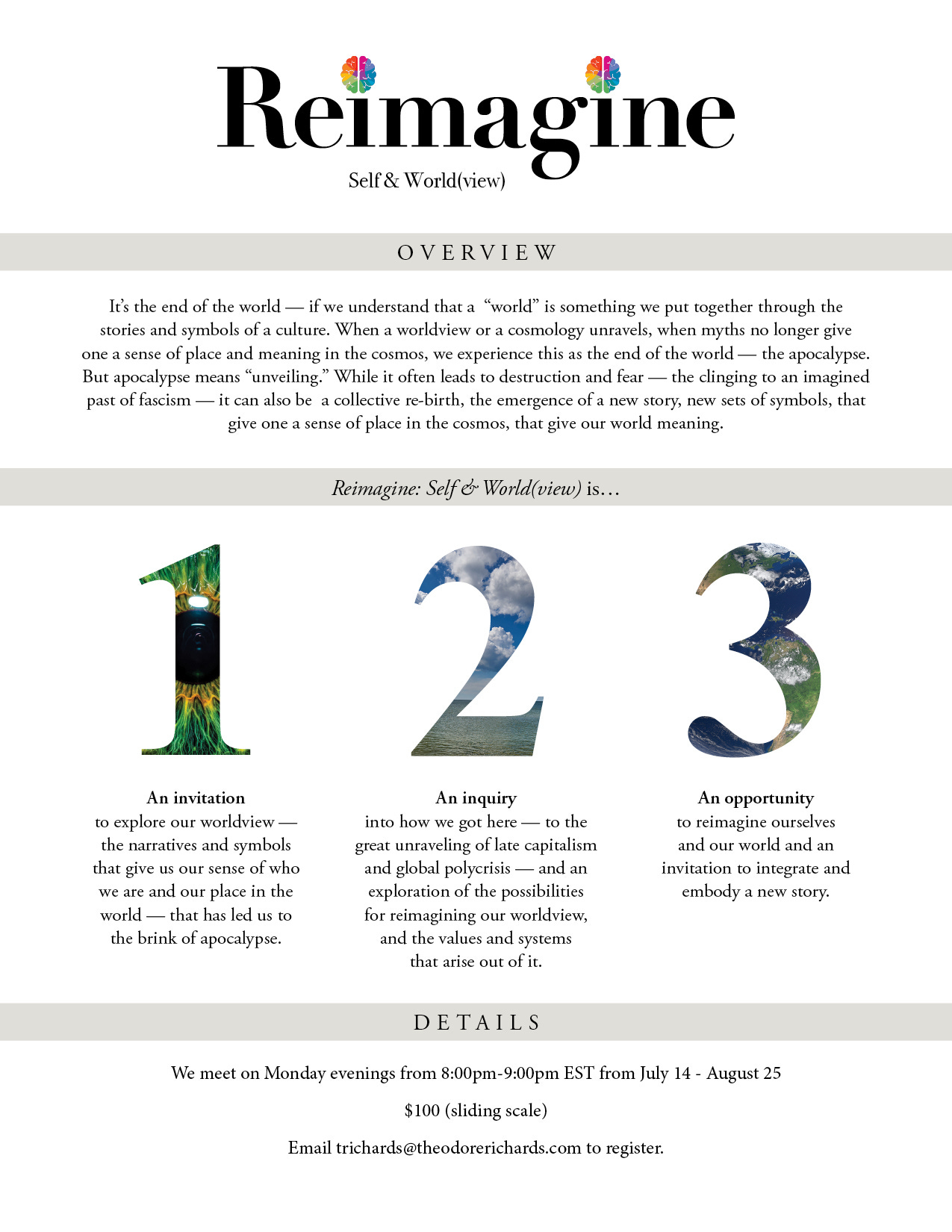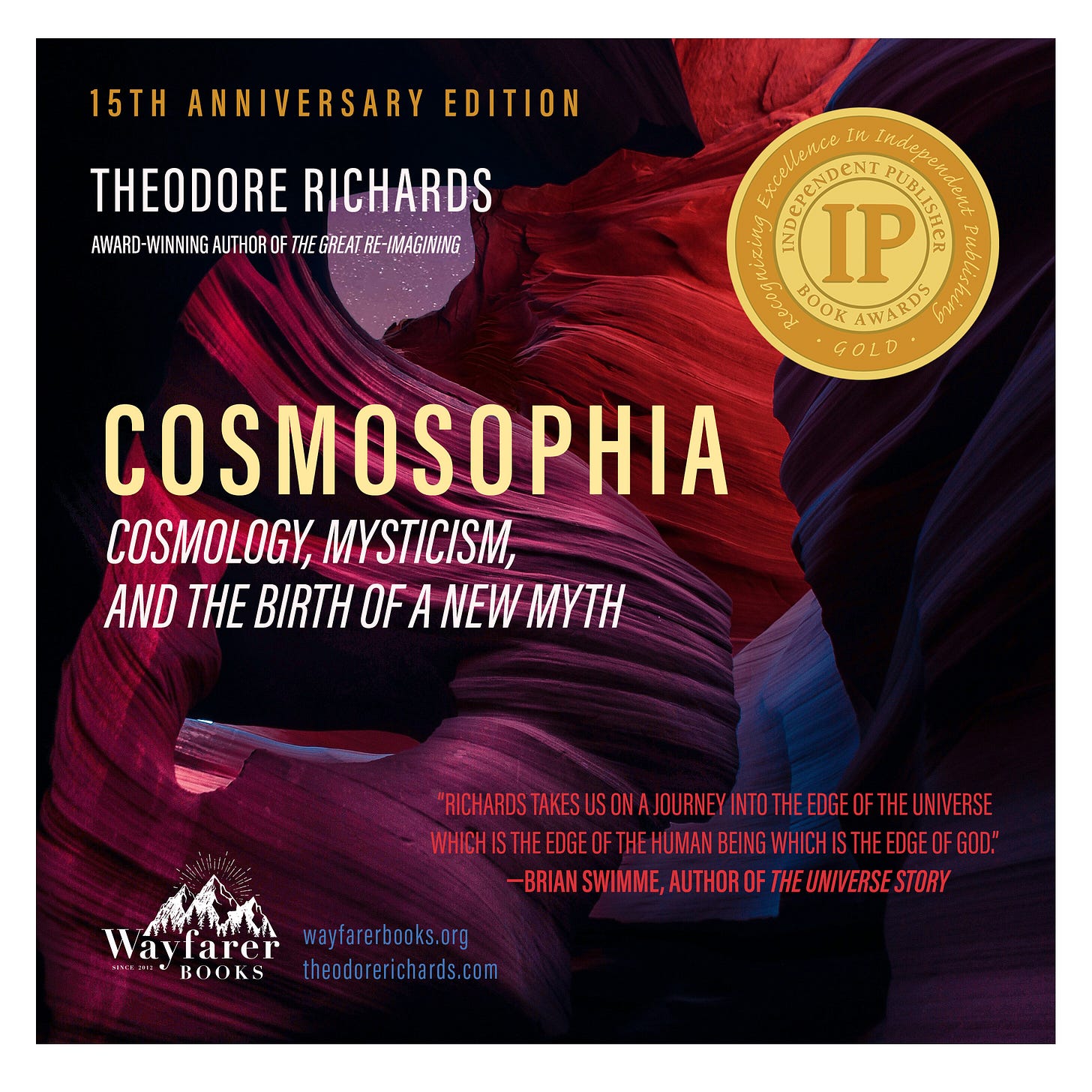Reimagining the World: A Conversation on Myth, Crisis, and Possibility
With Connor Wolfe and Theodore Richards
“We can only approach this edge with an honest unknowing—to pretend otherwise is to court the hubris that has brought with it so much trouble in the first place. But we must also do so with a sense of genuine power. Not the power of false and shrunken egos that need to own a world that they cannot feel a part of, but the power of people who bring with them an entire cosmos of wisdom, the power of a people who come from the stars and can make worlds with their words, their minds, their hands. At the edge of the world, we must find also the courage to leap into the abyss, knowing that there is no alternative but to be reborn.”
- Theodore Richards, The Great Reimagining: Spirituality in an Age of Apocalypse
Wolfe: You frame apocalypse not just as destruction, but as disconnection. Can you expand on what you mean by that?
Richards: Apocalypse literally means “unveiling.” Fundamentally it’s about what emerges in the wake of that destruction you refer to. But it isn’t necessarily about the literal destruction of the world; it’s about the loss of the narratives and symbols—the myths—that give us a sense of place and connection in the world: a worldview.
Wolfe: You draw from both ancient traditions and contemporary science. What do these seemingly different perspectives have in common when it comes to apocalypse?
Contemporary science, like those ancient traditions, gives us a narrative that describes and explains our world. The apocalyptic tradition is about what happens when that story begins to unravel, when a new story is revealed. And that’s happening today as we see an entirely new vision of the cosmos being revealed through modern science, a vision that has yet to be integrated into our way of thinking or our systems. What’s more, there’s this idea in modern cosmology that, because everywhere is the location of the big bang, and because time and space are linked, the edge of the universe is this moment. It’s not unlike what Biblical scholars call “realized eschatology.” This refers to the way that Jesus says that the end times are all around us, if we can only change our perception.
Wolfe: Do you believe we are currently in an apocalyptic moment, or are we just more aware of the cracks that were always there?
Both. Some of us have noted for decades about the unraveling. And in a sense there’s always something new being born, something dying. This is the insight I’ve described in the previous question with realized eschatology. But there are some particulars of this moment that make it exceptional.
Wolfe: The title of this course suggests not just an ending, but a beginning. What does “re-imagining” mean to you in this context?
Richards: As I said before, apocalypse means unveiling. It’s not just what ends; it’s what’s revealed when the old order collapses. And this happens most beautifully when humans can come together to use the imagination to co-create a new world, a new worldview, a new story.
Wolfe: Do you see signs that people or cultures are already starting to re-imagine their place in the world in meaningful ways?
Richards: Absolutely. I see this with my children, and children generally. That’s just what they do! They imagine and reimagine worlds through play. And I also have to say that there are many people, those living at the margins of mainstream society and outside of centers of power, who have never really bought into some of the values of capitalist, colonial culture. They have known for a long time that things were off—the rest of us are catching up.
Wolfe: What kind of mindset shift do you think we need to truly face and move through this apocalyptic moment?
Richards: I really think that this is the biggest challenge—perception, and overcoming fear of the unknown. Fascism is all about that fear, and we can see the results all around us. And even when it’s not exactly fear, it’s just hard for people to perceive something “beyond the veil.” In other words, our minds really don’t see what can’t find a place within the parameters of one’s cosmology. It’s like if you ask a fish how the water feels: they won’t even notice, and can’t imagine the world above water.
Wolfe: What inspired you to create “ReImagine: Self & World(view)”? Why now?
Richards: In some ways, this is work I’ve been engaged in for a while. Decades. Many of us have seen that the industrial capitalist worldview is literally destroying the planet for a while now. But I cannot help but feel a particular urgency at this moment. Looking at how the fascist regime is trying to destroy everything… we have to do something! And I think it’s got to be something beyond the old paradigm. We don’t need another “class” or “training”. We don’t need a new institution. We need to build webs of connection. That’s what this is.
Wolfe: What were your own “apocalyptic” moments of reimagining?
Richards: There are several, and I’ve written about them over the years. Witnessing the birth of my children. Birth is really the model for apocalypse: a re-emergence into a new world. And there were moments before this when I was young and traveling the world that had that quality. I think that any personal moment when we are forced to see the world differently gives us this apocalyptic sensibility. And more recently, of course, I have watched young people, my own children and the youth I worked with through The Chicago Wisdom Project, grapple with this new world.
Wolfe: What does reimagining mean to you personally?
Richards: It’s easy to get caught up in the despair of it all. And, while I don’t wish to minimize the suffering going on in the world, I also want to emphasize the genuine opportunity that is presenting itself as well. This is an opportunity to do what humans have always done—co-create our world through symbol and story. It’s our imagination that is really required, to engage in the world with a poetic sensibility, which is the opposite of what the fascists want.
Wolfe: What do you think people will get from the process? Is there a longer term vision beyond this initial engagement?
Richards: The initial and ongoing thing is community. It’s about connecting. When we feel alone, it’s too easy to fall into despair. But knowing that we are in this together, to find connection and kinship—we can get through anything if we can do this. And then, more specifically, it’s about seeing the world through a different lens. So many people can intuit that something is wrong, but they don’t yet have the language—much less any kind of institutional structure—to really transform the world as we must. I see this process as a beginning. A way to make some connections and begin the process of reimagining. But my hope is that people will get started with me on this journey and that we’ll continue it together.
ReImagine: Self & World(view) will meet on Monday evenings from 8:00pm-9:00pm EST from July 14 - August 25
The cost is $100 (sliding scale)
Contact us here or email us at trichards@theodorerichards.com to register.








